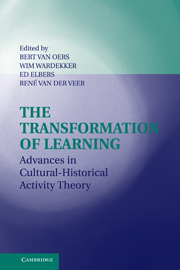Book contents
- Frontmatter
- Contents
- List of Contributors
- Preface
- INTRODUCTION
- SECTION ONE TENETS OF ACTIVITY THEORY
- Introduction to Section One: Exploring Vygotsky's Legacy: The Meaning of Mediation
- 2 Multiple Readings of Vygotsky
- 3 Exploring the Links between External and Internal Activity from a Cultural-Historical Perspective
- 4 Reflections on Points of Departure in the Development of Sociocultural and Activity Theory
- 5 Language in Cultural-Historical Perspective
- 6 The Formation Experiment in the Age of Hypermedia and Distance Learning
- 7 Constructivism and Meaning Construction
- 8 Subject, Subjectivity, and Development in Cultural-Historical Psychology
- SECTION TWO IDENTITY, DIVERSITY, AND INCLUSION
- SECTION THREE DYNAMICS OF ACTIVITY AND THE VARIATIONS OF LEARNING
- Index
- References
Introduction to Section One: Exploring Vygotsky's Legacy: The Meaning of Mediation
Published online by Cambridge University Press: 25 August 2009
- Frontmatter
- Contents
- List of Contributors
- Preface
- INTRODUCTION
- SECTION ONE TENETS OF ACTIVITY THEORY
- Introduction to Section One: Exploring Vygotsky's Legacy: The Meaning of Mediation
- 2 Multiple Readings of Vygotsky
- 3 Exploring the Links between External and Internal Activity from a Cultural-Historical Perspective
- 4 Reflections on Points of Departure in the Development of Sociocultural and Activity Theory
- 5 Language in Cultural-Historical Perspective
- 6 The Formation Experiment in the Age of Hypermedia and Distance Learning
- 7 Constructivism and Meaning Construction
- 8 Subject, Subjectivity, and Development in Cultural-Historical Psychology
- SECTION TWO IDENTITY, DIVERSITY, AND INCLUSION
- SECTION THREE DYNAMICS OF ACTIVITY AND THE VARIATIONS OF LEARNING
- Index
- References
Summary
When Vygotsky died in 1934, he left us with a set of general guidelines (e.g., true insight into a phenomenon can be gained only by studying its genesis, individual mind can be explained only by looking outside individual mind), methods of investigation (e.g., the method of double stimulation), and specific ideas (e.g., the systemic structure of mind and brain, the notion of scientific concepts, the zone of proximal development), but not with a fully coherent and systematically elaborated theory. With hindsight we can see that many of these guidelines, methods, and ideas were clearly historically or logically connected, but at the time Vygotsky did not always spell out their connection.
Take, for example, what Vygotsky called the genetic law of mental development and his concept of the zone of proximal development. The genetic law of mental development stated that “every function in the cultural development of the child appears on the stage twice, in two planes, first, the social, then the psychological, first between people as an interpsychological category, then within the child as an intrapsychological category” (Vygotsky, 1931/1983, p. 145; cf. Vygotsky, 1997, p. 106). The law clearly stated that private mental processes originate in the social interaction with other people and was present in Vygotsky's writings from at least 1931.
The concept of the zone of proximal development (the difference between joint and independent performance) was developed several years later.
Information
- Type
- Chapter
- Information
- The Transformation of LearningAdvances in Cultural-Historical Activity Theory, pp. 15 - 19Publisher: Cambridge University PressPrint publication year: 2008
